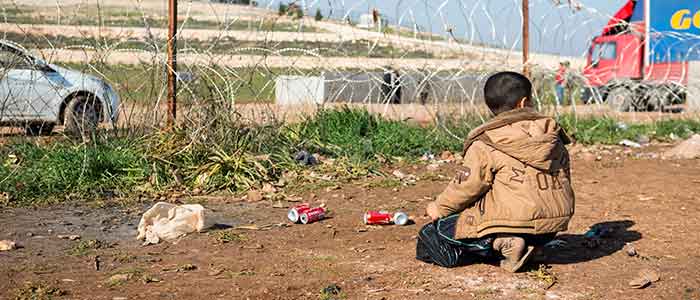Web_SyrianBoyTurkishBorder_iStock_000024765194_Large.jpg

Young Syrian refugee at Turkish border
The UN’s humanitarian coordinators for seven countries across the Middle East and North Africa stressed the world’s first WHS, which takes place later this month in Turkey, is a “unique opportunity” to address shortcomings in the response so far.
In a joint statement, they wrote: “We call on global leaders to attend the summit and make it a success.
“That means listening to the voices of the region and taking the bold decisions that will effect change.”
They said that the “feelings and demands” of those living the region were clear. They added that they were outraged at the “staggering level” of human tragedy and suffering on a daily basis and the lack of accountability over clear violations in international law.
At the same time, the officials are disappointed in the humanitarian system for failing to build capacity in local responses and adamant that humanitarian aid cannot be a substitute for political action.
“Leaders must assume their responsibility to find political solutions to end the bloodshed and prevent further suffering. States and other actors need to respect the rules of war and hold accountable those who do not,” the humanitarian coordinators stated.
The officials are coordinating the humanitarian response in Iraq, Jordan, Lebanon, Libya, Palestine, Syria and Yemen – all countries ravaged by widespread and relentless violence, extremism and war.
Across the region, 55 million people are in need of some form of assistance to ensure their basic survival, with little access to food, water, healthcare, education and shelter.
In both Syria and Yemen, there have been well documented allegations of breaches in international humanitarian law, which, for example, prohibits attacks on refugee camps, hospitals and other civilian targets.
The UK government has been heavily criticised for its lack of action regarding allegations that Saudi Arabia has violated international humanitarian law in its bombing campaign in Yemen.
The government does not accept breaches have taken place, despite incidents being recorded by the UN and a number of respected international NGOs. The UK has and continues to sell billions of dollars worth of arms to Saudi Arabia.
The humanitarian coordinators added that responsibility also relies with the humanitarian community.
As the need for humanitarian assistance has rapidly increased in recent years, with the number of conflicts and disasters quickly multiplying and lasting longer, resources have not been able to keep pace with demand.
The system has faced increasing criticism and dissatisfaction from those working for it, and local and national organisations attempting to work alongside it, as well as those it is supposed to serve.
The UN-backed World Humanitarian Summit was organised in hopes of addressing these issues and overhauling the humanitarian sphere to make it fit for purpose.
It will take place in Istanbul, Turkey, from the 23-24 May.
The humanitarian coordinators who authored today’s statement were:
· Lise Grande, humanitarian coordinator for Iraq
· Edward Kallon, humanitarian coordinator for Jordan
· Philippe Lazzarini, humanitarian coordinator for Lebanon
· Ali Al-Za’tari, humanitarian coordinator for Libya
· Robert Piper, humanitarian coordinator for the Occupied Palestinian territory
· Yacoub El Hillo, humanitarian coordinator for Syria
· Kevin Kennedy, regional humanitarian coordinator for the Syria crisis
· Jamie McGoldrick, humanitarian coordinator for Yemen













